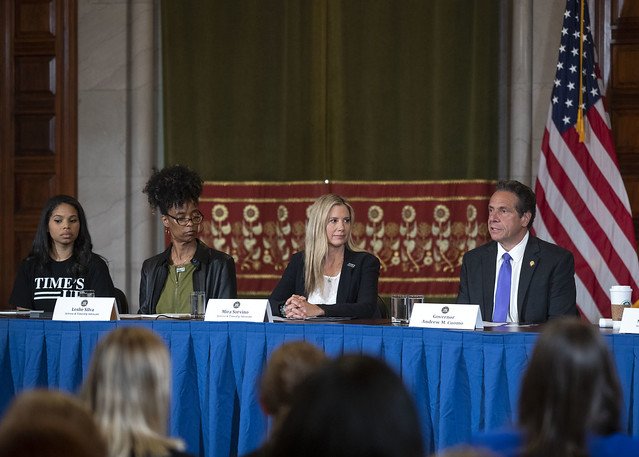Cuomo And Time's Up Urge Legislature To End Rape Reporting Statute Of Limitations
June 12, 2019, 4:35 p.m.
"There comes a moment in time when society stands up and says enough is enough. And I believe we are at that moment."

Governor Andrew M. Cuomo at a press conference with Mia Sorvino and other Times's Up advocates in the Red Room at the State Capitol.
In the next six days, Governor Andrew Cuomo and Time's Up want the New York State legislature to make overdue updates to archaic legal standards surrounding sexual abuse and harassment. The last day of the legislative session comes on June 19th.
On Wednesday, Cuomo convened a press conference in Albany, where he was joined by actor Mira Sorvino and members of Time's Up, an organization and legal fund dedicated to advancing workplace equality. The governor echoed concerns laid out in a NY Daily News op-ed he co-authored with actor Julianne Moore, published today. Allowing survivors of rape in the second and third degrees just five years to report leaves them too small a window to pursue prosecution, Cuomo explained, and employees should not have to demonstrate sexual harassment was "severe or pervasive" in order to prove it created a hostile work environment.
"We have a moment in time today to recognize a major problem that has existed," Cuomo said at the press conference. "A dirty little secret of society, which is that sexual harassment, sexual abuse of women is a widespread, pervasive issue that has gone on for years in a male-dominated society where men write the laws from their perspective, and a male-dominated society where men enforced the laws."
However, he continued, "There comes a moment in time when society stands up and says enough is enough. And I believe we are at that moment."
New York state differentiates between the various degrees of rape essentially on the basis of age and incapacitation; "forcible" rape, itself a nebulous concept, falls in the first degree bracket, and can lead to criminal action at any time a victim decides to pursue it. According to current state law, second degree rape occurs when someone 18 years or older has sex with someone 15 years or younger, or when someone has sex with a person who cannot consent because of a mental disability or incapacitation. Third degree rape occurs when someone 21 years or older has sex with someone 17 years or younger; or when someone has sex with a person who can't consent for reasons other than being under 17, or other than being incapacitated.
State law currently places a five-year statute of limitations on second and third degree rape, meaning that survivors who wish to file charges are in a race against time. According to RAINN, about three in four sexual assaults go unreported nationwide. Among the most common reasons that victims who do not go to the police cite are fear of retaliation, and a lack of confidence in law enforcement's ability or willingness to help. The latter is not unfounded: For every 1,000 sexual assaults that occur, RAINN estimates that just 46 cases will lead to arrest, nine will be referred to prosecutors, and five will end in felony convictions.
But there are myriad reasons why a person who's been raped or assaulted might not want to go to the police: The reporting process often re-traumatizes the victim, subjecting them to invasive physical exams and a battery of questions that, even when they do serve a forensic purpose, may seem to blame the victim: What were you wearing? How many drinks did you have? Were you walking alone? And even if the spate of survivor testimonials surfaced in the course of the #MeToo movement remind us that pretty much every woman-identifying person you know has, at some point, been harassed because of their gender or gender identity, victims are accustomed to the expectation that they will not be believed. Often, they aren't.
"There are periods of time where a victim is not, for one reason or another, able to state a claim or willing to state a claim or has come to terms to state the claim," Cuomo acknowledged Wednesday. "There should be no statute of limitations for rape in the second and third degrees, as far as I'm concerned, but certainly five years is an abject dereliction of justice."
With respect to workplace sexual harassment, the state's current definition holds that misconduct must be "severe or pervasive" in order to be actionable, which Cuomo called "a terrible legal standard." One incident on its own may not qualify, an idea Sorvino—who has been vocal about the sexual harassment she endured from Harvey Weinstein, and who on Wednesday publicly identified as a rape survivor for the first time—slammed at the press conference.
"Sexual harassment is the gateway drug for predators," she said. "If a person is able to get away with sexual harassment, it's a testing ground. It's a way for people in power to test the boundaries of what the people working with them or for them can endure."
WATCH: Actress and #TimesUp advocate @MiraSorvino reveals new, compelling and emotional details about her own sexual assault experience in a push for NY to remove the 5-year statute of limitations on rape, and to remove 'severe and pervasive' from sexual harassment language. pic.twitter.com/SkiKS35u5b
— Erika Leigh (@_ErikaLeigh) June 12, 2019
Additionally, Cuomo asked that employers include language in their non-disclosure agreements clarifying that employees have the right to pursue legal action for, or help in an investigation into, workplace sexual harassment.
These are all proposals Cuomo made in January, embedding the TIME'S UP New York Safety Agenda in his executive budget, but wound up on the cutting room floor. Democratic legislators have introduced bills that would repeal the statute of limitations and the "severe or pervasive" standard, outlawing discriminatory harassment full stop. Now, Cuomo urges lawmakers to pass legislation on both issues before the session ends.